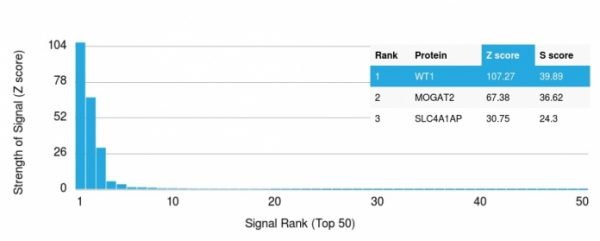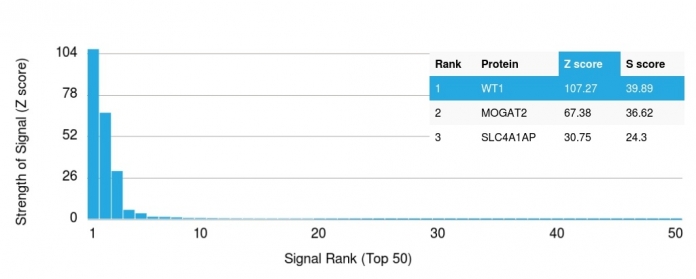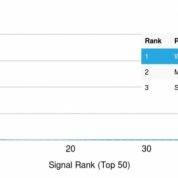Human Anti-Wilm's Tumor 1 (WT1) (Wilm's Tumor & Mesothelial Marker) Antibody Product Attributes
Species: Human
Tested Applications: IHC.
Clonality: Monoclonal
Anti-Wilm's Tumor 1 (WT1) (Wilm's Tumor & Mesothelial Marker) Antibody Clone: rWT1/857
Clone rWT1/857 Host and Isotype: Mouse IgG1, kappa
Anti-Human Wilm's Tumor 1 (WT1) (Wilm's Tumor & Mesothelial Marker) Positive Control Sample: K562 cells. Wilm s Tumor, mesothelioma or fetal kidney.
Cellular Localization of Antibody rWT1/857 Staining: Cytoplasmic
Buffer and Stabilizer: 10mM PBS with 0.05% BSA & 0.05% azide. Also available without BSA & Azide.
Antibody Concentration: 200 ug/ml
Antibody Purification Method:Protein A/G purified from Bioreactor concentrate.
Immunogen: Recombinant full-length human WT1 protein
Storage Conditions: Store at 2 to 8 C (refrigerate). Stable for 24 months when properly stored.
Wilm's Tumor 1 (WT1) (Wilm's Tumor & Mesothelial Marker) Previously Observed Antibody Staining Patterns
Observed Subcellular, Organelle Specific Staining Data:
Anti-WT1 antibody staining is expected to be primarily localized to the nucleoplasm.Observed Antibody Staining Data By Tissue Type:
Variations in Wilm's Tumor 1 antibody staining intensity in immunohistochemistry on tissue sections are present across different anatomical locations. An intense signal was observed in myoepithelial cells in the breast, cells in the endometrial stroma in endometrium, glandular cells in the fallopian tube, cells in the glomeruli in kidney and cells in the seminiferous ducts in testis. More moderate antibody staining intensity was present in myoepithelial cells in the breast, cells in the endometrial stroma in endometrium, glandular cells in the fallopian tube, cells in the glomeruli in kidney and cells in the seminiferous ducts in testis. Low, but measureable presence of Wilm's Tumor 1 could be seen inglandular cells in the breast and epididymis, cells in the tubules in kidney, decidual cells in the placenta, trophoblastic cells in the placenta, glandular cells in the prostate and seminal vesicle, adipocytes in mesenchymal tissue, fibroblasts in mesenchymal tissue and cells in the red pulp in spleen. We were unable to detect Wilm's Tumor 1 in other tissues. Disease states, inflammation, and other physiological changes can have a substantial impact on antibody staining patterns. These measurements were all taken in tissues deemed normal or from patients without known disease.Observed Antibody Staining Data By Tissue Disease Status:
Tissues from cancer patients, for instance, have their own distinct pattern of Wilm's Tumor 1 expression as measured by anti-Wilm's Tumor 1 antibody immunohistochemical staining. The average level of expression by tumor is summarized in the table below. The variability row represents patient to patient variability in IHC staining.| Sample Type | breast cancer | carcinoid | cervical cancer | colorectal cancer | endometrial cancer | glioma | head and neck cancer | liver cancer | lung cancer | lymphoma | melanoma | ovarian cancer | pancreatic cancer | prostate cancer | renal cancer | skin cancer | stomach cancer | testicular cancer | thyroid cancer | urothelial cancer |
|---|---|---|---|---|---|---|---|---|---|---|---|---|---|---|---|---|---|---|---|---|
| Signal Intensity | - | - | - | - | - | +++ | - | - | - | - | ++ | +++ | - | - | - | - | - | - | - | - |
| WT1 Variability | ++ | + | + | + | + | ++ | + | + | + | + | ++ | ++ | + | + | ++ | + | + | + | + | ++ |
Limitations and Warranty
enQuire Bio's product, Wilm's Tumor 1 (WT1) (Wilm's Tumor & Mesothelial Marker) MonoSpecific Antibody, is available for Research Use Only (RUO-Only). This antibody is guaranteed to work for a period of two years when properly stored.







There are no reviews yet.